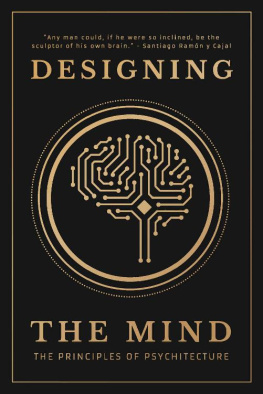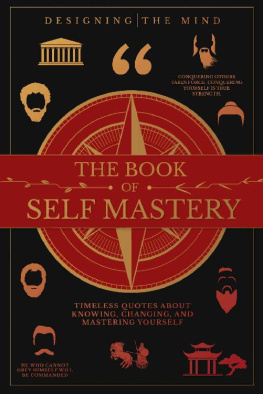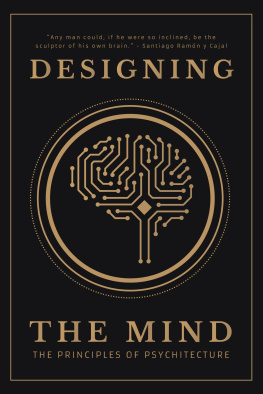Designing the Mind: The Principles of Psychitecture

DESIGNING THE MIND
First published by Designing the Mind 2021
Copyright 2021 by Designing the Mind, LLC.
All rights reserved. No part of this publication may be reproduced, stored or transmitted in any form or by any means, electronic, mechanical, photocopying, recording, scanning, or otherwise without written permission from the publisher. It is illegal to copy this book, post it to a website, or distribute it by any other means without permission.
Introduction
The year is 2084. Youre playing a game of four-dimensional basketball, and one of your teammates makes a backhanded insult about your free throw skills. Immediately, a few things happen in your mind.
1. You feel pain.
2. You have the urge to reach through your virtual reality brain implant and make the guy regret his smug little comment.
3. Your self-esteem spends the next few days/weeks in a tailspin, causing you to ruminate over the insult, imagine and reimagine how you wish you had responded, and suffer.
But in the midst of this process, you think to yourself, Wait a minute - its 2084. We have technology for this."
So you open up an application through your neural interface that allows you to quickly modify your own brain. You sit through a few mind advertisements, try not to think any thoughts the government wouldnt like, and then youre in.
With just a few brain clicks, you are able to tell the software to remove your tendencies to suffer, seek revenge, and ruminate when someone insults you. You even add a feature that allows you to actually feel joy when you are insulted and to quickly respond with a witty and good-natured retort. Your new automatic response allows you to diffuse hostile situations and look like a rockstar, instantly making that awful sting of an insult a thing of the past.
By the year 2084, it is entirely plausible that we could have a method for directly modifying our brains to remove the maladaptive tendencies that hold us back. But unless this book has stood the test of time unreasonably well, you are most likely reading in an era in which this process will sound like science fiction. We can't just remove our mental bugs with a few clicks. Our ingrained psychological limitations are set in stone for the time being, right?
We are not as powerless as you may think. With the right cognitive tools, it is possible for anyone to make modifications to their own psychological software: their mind. Our unwanted psychological tendencies really do break down into what can be compared to software algorithms. In this case, the insult is an input which triggers a kind of mental program. This program initiates a distorted thought cycle that causes you to reevaluate your self-worth in response to disrespect from your peers. This thought cycle then outputs emotional and behavioral responses which cause you to feel terrible and react impulsively.
Because these responses were programmed into us eons ago, humans have had a very long time to study them. Though they lacked our modern technological metaphors, ancient thinkers began examining and developing counter-algorithms for many of our problematic mental modules.
These thinkers had the forethought to write their insights down for posterity, and their wisdom, however scattered and diverse, is the open-source code we can use to program our own minds. My long-term goal is to curate and systematize these tools of software self-optimization and distribute them to as many people as possible. I want to do the next best thing to giving you an instant brain-modification implant. I want to provide you with a handbook for designing and optimizing your own psychological software.
Most people who read books to improve themselves do it because they want to advance their careers, lose weight, or make more money. Why am I designing my mind? you may ask, What am I getting out of it? If this is you, I will go ahead and weed you out by announcing that this book will not directly help you attain or achieve anything out there in the world. It wont turn you into a master of seduction or a champion of your conference room. It will not get you abs.
This book is for those who find the idea of building a better mind thrilling in and of itself. It is for those who are impassioned by the thought of cultivating greater wisdom, self-control, or tranquility - who are drawn to the philosophies of Buddhism and Stoicism or the fields of humanistic psychology and psychotherapy. We all want to be happier, healthier, better people. But only a few grasp that all of our highest aims can be reached by placing our focus directly on our minds.
If this describes you, you are what we will call a psychitect. You are among a collective of rare individuals who are excited by the idea of overcoming the seemingly fixed parts of themselves. You view the default state of your mind as an invitation to intervene and transmute. You want to unflinchingly look reality in the eye and find ways to alter it. You want to live a great life - not a normal one. If this is you, read on.
What do you dislike about your mind? Which patterns emerge when you examine your life - patterns you feel have held you back? Does fear prevent you from pursuing your ambitions? Does jealousy ruin your relationships? Do you allow distractions to rule your life? Do you have an inner critic whose expectations you are never able to meet?
This book will make the bold claim that the human condition as you know it - is optional. That it is possible for you to unplug from your own mind, examine it from above, and modify the very psychological code on which you operate, permanently altering these limiting patterns.
You will learn to build unshakable peace and levity into your mind so you can embrace whatever life throws at you while responding with effective action. You will develop the skills to think with razor-sharp clarity, overcome your own distortions of judgment, and cultivate wisdom so you can make the right decisions in your life. You will learn to build the habits, lifestyle, and character which will gradually enable you to become your ideal self.
And to begin this process, you wont have to wait one day for futuristic technology to arrive. You can rewire the default behaviors, emotional responses, and biases that hold you back. You can learn the principles and practices for building a mind better than you ever thought possible, one algorithm at a time. Most importantly, you can internalize a mindset that will allow you to take this process beyond what you read in this book. And as you scale the heights of self-mastery, you will gradually come to resemble the legendary figures who have unlocked radically superior states of mind.
This is not yet another book promising useful tricks for happiness like gratitude journals and cold showers or singing the praises of positive thinking, neuro-linguistic programming, or mindfulness meditation (although that one will have its place). I will refer to ideas and techniques which have been viewed through the lens of spirituality. But every mindset and method you find in this work is rational, psychological, and empirical. This book is based on the time-tested insights of ancient thinkers, the science of neuroplasticity, and findings within cognitive, affective, and behavioral science. It looks at the ways ordinary (and extraordinary) people can modify the software of their minds to dramatically impact their lives today. The ways we can structure our minds directly for wisdom, well-being, and character, and to reach toward our highest visions for ourselves.



![Dzhon Hargrejv - Mind Hacking [How to Change Your Mind for Good in 21 Days]](/uploads/posts/book/875008/thumbs/dzhon-hargrejv-mind-hacking-how-to-change-your.jpg)





